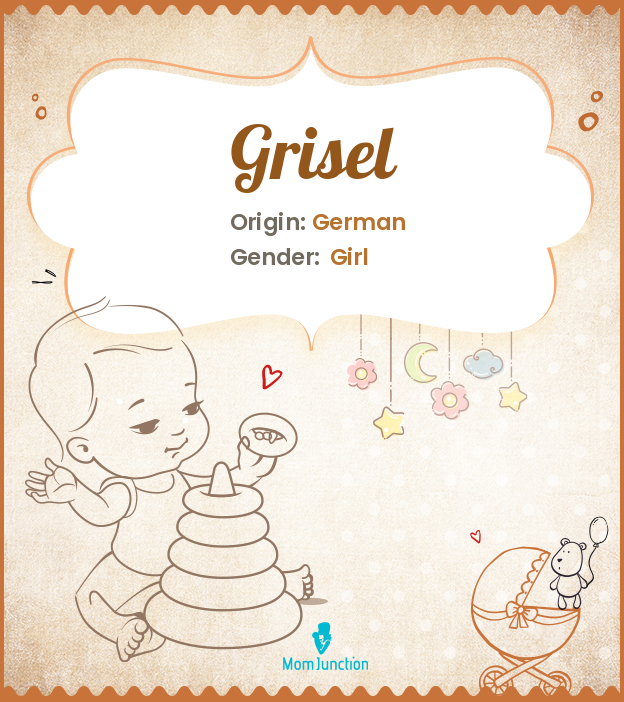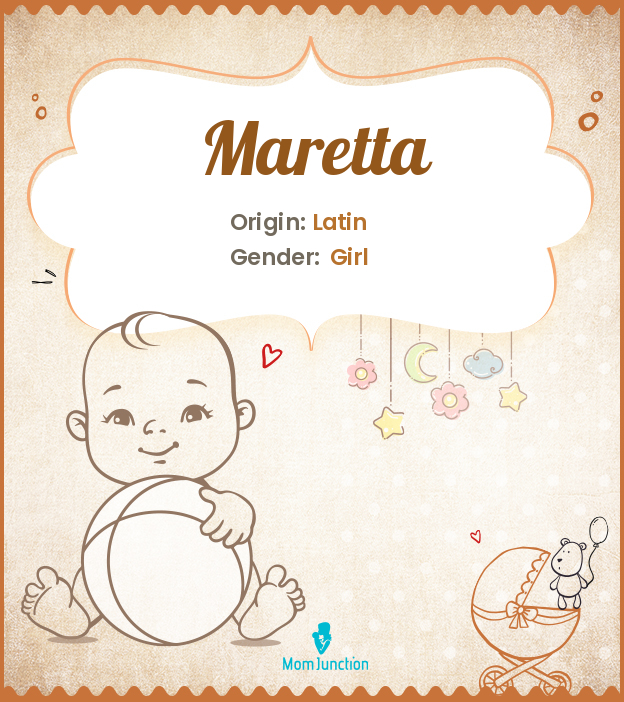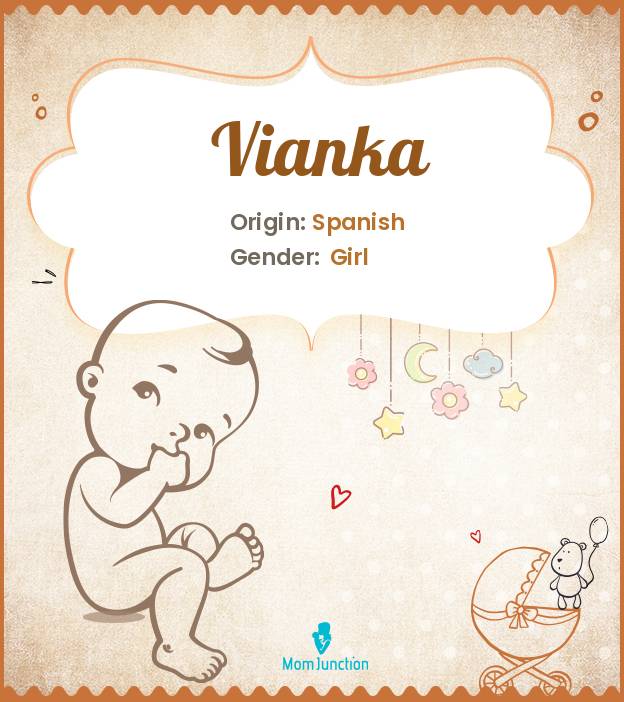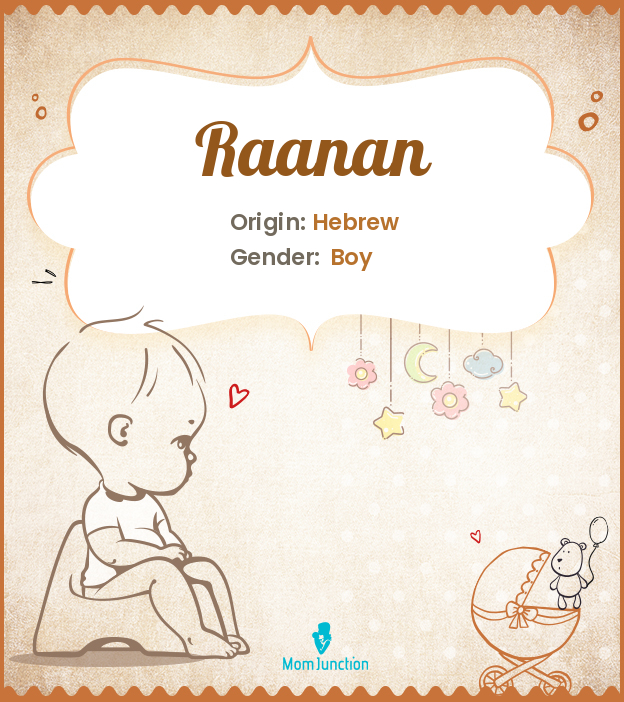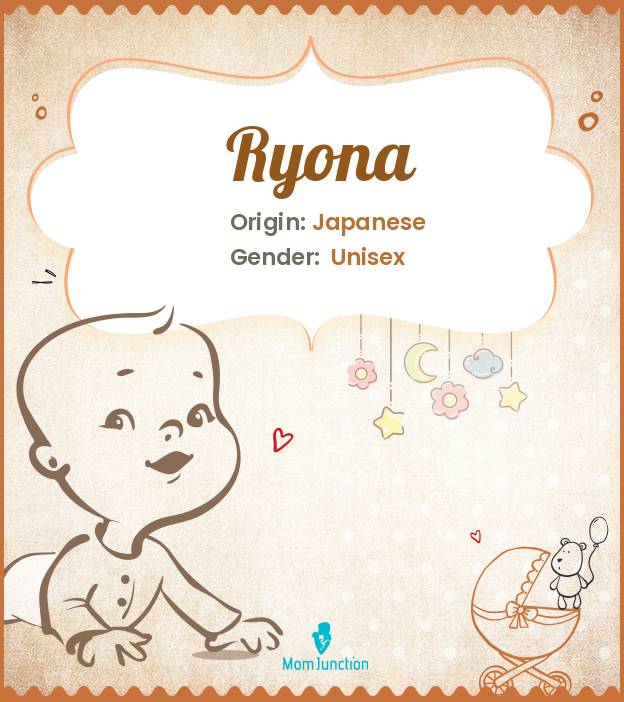
Image: Shutterstock
German last names have been influenced by the political and geographical changes that Germany experienced. So, most of the surnames in Germany are based on the profession and native places of people. However, many of these professions do not exist anymore, but the surnames still exist.

This post will give you a list of interesting German surnames with their meanings and origin.
Key Pointers
- German surnames have evolved with the country’s political and geographical changes.
- Many names originate from professions and native places.
- German surnames also reflect diverse professions and cultural traditions. Mahler, Mauer, Offen, and Peifer are a few examples.
- Aber, Adelberg, Eben, and Lemberg are some German surnames derived from prominent geographical locations.
List Of Popular German Last Names Or Surnames
1. Abel
The patronymic name means ‘noble one’ and is derived from the Old German personal name ‘Albrecht.’
2. Aber
This name is of Teutonic (a tribe that inhabited coastal Germany) origin, which means ‘illustrious.’ Another origin for the name could be the Old German word ‘Albrecht.’
3. Achen
It is a toponymic name referring to people who originally came from the city of Aachen in western Germany.
4. Adelberg
It is a toponymic name for the people who came from the town of Adelberg in Germany. The name is a combination of two German words ‘adel’ meaning ‘noble’ and ‘berg’ meaning ‘mountain.’
5. Altmann
This German surname is a variant of the name ‘Aldman.’ It translates into ‘old man’ in German.
6. Angert
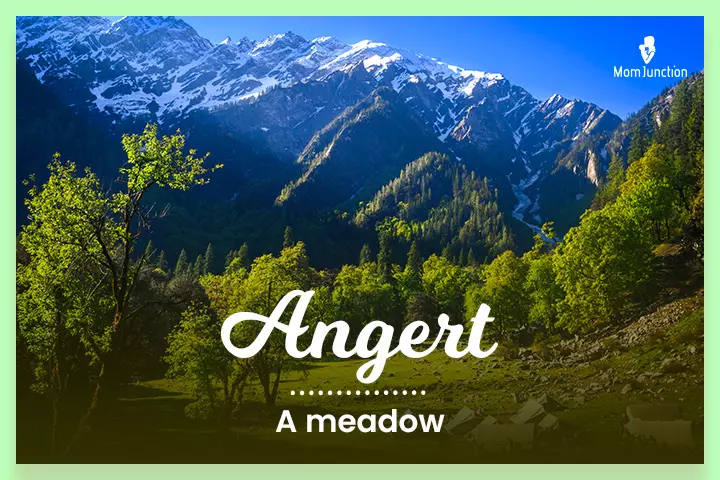
The surname is a variant of the German word ‘Anger,’ which means ‘meadow,’ ‘lawn’ or ‘greenery.’
7. Babler
It is a variant of the name ‘Babo,’ which is derived from the Old German name ‘Badubrecht.’ It means ‘battle-bright.’
8. Bach
It means a ‘stream,’ ‘brook,’ or a ‘creek’ in German. It is probably a toponymic name referring to someone who lived by a stream or a water body.
9. Bahn
It is a German toponymic surname that comes from the Middle High German word ‘ban’ meaning an ‘open space’ or an ‘open area.’
10. Balsiger
This is a toponymic name for people who hail from a place called Palzing in the Bavarian region of Germany.
11. Bank
It is the German word for ‘bench’ and was likely an occupational name for anyone in a profession that required a bench for work.
12. Banner
It is derived from the Middle High German word ‘Banier,’ which means ‘flag bearer.’ This German surname is probably an occupational one.
13. Bartel
It is derived from the German name ‘Bertwald,’ which comes from the Old High German words, ‘beraht’ meaning ‘bright’ and ‘wald’ meaning ‘rule.’
14. Bayer
The regional name denotes a person from the German state of Bavaria, which is called ‘Bayern’ in German. It is one of the notable German last names that start with B.
15. Billman
This toponymic surname denotes a dweller along the river Bille in Hamburg, Germany.
16. Candler
It is a spelling variant of ‘Kandler,’ which is an occupational name for a potter.
 Did you know?
Did you know?17. Canter
It is the German variant of the name ‘Kanter’ or ‘Kantor,’ which is an occupational name for a schoolmaster or a choirmaster.
18. Dahm
It is a toponymic name for people from several places called Dahme in Germany.
19. Danner
It is likely derived from the Middle Low German word ‘dan,’ which means ‘pines’ or ‘forest.’ It is a German toponymic name for people who live near the forest.
20. Debus
It is derived from the name ‘Matthaus,’ which is the German variant of the name ‘Matthew’ that means ‘gift of God’ in Hebrew.
21. Decker
It comes from the German word ‘decke’ meaning a ‘ceiling,’ ‘roof’ or ‘cover.’ This occupational surname refers to a ‘carpenter,’ ‘builder’ or someone who thatches a roof.
22. Degler
An occupational name for a potter, where degel means ‘pot’ or ‘earthenware’ in Low German.
23. Deichert
It is an altered version of ‘Teicher,’ which is a toponymic surname for people who live by a pond. ‘Teich’ is the German word for ‘pond.’
24. Dell
It comes from the Low German word ‘delle,’ which means dell – a small valley in English. Another origin is the German word ‘edel,’ which means ‘noble’ or an ‘aristocrat.’
25. Denhart
It is derived from the German name ‘Degenhardt,’ which is composed of Old German words, namely ‘degen’ meaning ‘young warrior’ and ‘hardt’ meaning ‘strong.’
26. Eben
It is a German toponymic surname referring to people who originally came from the place called Eben in Bavaria, Germany.
27. Eberhardt
It is a combination of the German words ‘eber,’ meaning a ‘boar,’ and ‘hardt,’ meaning ‘strong’ or ‘tough.’ The name thus means ‘strong boar’ or ‘brave boar.’
28. Ebert
It is related to the name ‘Eberhardt’ and means ‘strong boar.’ Another origin could be the name ‘Herbert,’ which comes from the Old German words ‘hari’ meaning an ‘army’ and ‘beraht’ meaning ‘bright.’
29. Eckstein
It comes from the Old German words ‘ecke’ meaning ‘edge’ or ‘corner’ and stein meaning ‘stone.’ This German surname is either toponymic referring to someone who lived on a cliff or occupational referring to a stonemason.
30. Edinger
It is a toponymic surname for someone who is from any of the several places called Edingen in Germany.
31. Eggemann
It is a variant of the name ‘Eckmann’ where ‘ecke’ is the Old German word for ‘edge’ or ‘corner.’ This surname likely refers to someone who lived on the edge of a hill or corner of two streets or corner of a field.
32. Eichmann
It is a combination of the Middle High German word ‘Eiche’ meaning ‘oak’ and ‘mann’ meaning ‘man.’ The surname thus translates to ‘oak man’ and could be a toponymic surname referring to someone who lived near an oak tree.
33. Eidman
It is a short form of a German personal name ‘Aido,’ which probably derived from ‘Eid’ meaning an ‘oath.’
34. Eiker
It is a spelling variant of the German name ‘Eicher,’ which comes from the word ‘Eich’ meaning an oak tree.
35. Eisenberg
It is a combination of Middle High German words ‘Eisen’ meaning ‘iron’ and ‘berg’ meaning ‘mountain.’
36. Eisenhauer
‘Eisen’ means ‘iron’ and ‘hauer’ means ‘to hew’ or ‘to cut.’ It is a German occupational name for a blacksmith.
37. Esther
It is a toponymic name for those who are from a place named Ester in Bavaria, Germany.
38. Eulberg
The toponymic name refers to someone from Eulenburg or Eilenburg in Germany.
39. Eyer
It is a variant of the name ‘Egger,’ which originated from the German word ‘eggen’ meaning ‘to harrow.’ This surname is likely an occupational one referring to a farmer.
40. Fackler
This occupational surname originates from Middle High German and refers to a ‘torchbearer’ or ‘torchmaker.’
41. Fahrer
It is an occupational name for a ferryman and a toponymic name for those who live by a ferry.
42. Falkner
It is an occupational name for ‘falconer’ whose job was to look after the birds (falcons) and train their young ones.
43. Fassbender
It is derived from the word ‘Fassbinder,’ which is the combination of two Middle High German words, namely ‘faz’ meaning ‘barrel’ and ‘binder’ meaning ‘joiner.’ The surname ‘Fassbender’ is an occupational name referring to a cooper.
44. Faust
It is derived from the Middle High German word ‘fust’ meaning ‘fist’ thus referring to a strong person. Another reference for the surname could be the Latin word ‘Faustus,’ which means ‘favorable’ or ‘lucky.’
45. Fink

It is the German name for the bird ‘Finch.’ The surname is originally considered to be a nickname for a lively and cheerful person.
46. Funke
It is a nickname for a blacksmith or a person who is of short stature and lively or irritable. The surname likely originated from the Middle High German word ‘vunke’ meaning ‘spark.’
47. Gabel
It is the German word for ‘fork.’ It is an occupational surname for someone who was a seller or maker of all types of forks including pitchforks.
48. Gebhardt
It is a personal name composed of two words, namely ‘geb’ meaning ‘gift’ and ‘hardt’ meaning ‘strong’ or ‘hard.’
49. Gehr
It is derived from the Old German word ‘ger,’ which means ‘spear.’
50. Geiss
It is an occupational name for a goatherd derived from the word ‘geiz’ meaning ‘goat.’
51. Geller
It comes from the German word ‘gellen,’ which means a ‘shrill sound’ or ‘to yell.’ It was probably an occupational surname for a town crier.
52. Gerner
A toponymic name for someone hailing from any of the several places called Gern in Bavaria, Germany.
53. Gerwig
It is a German surname made from the Old German words ‘ger’ meaning ‘spear’ and wig meaning ‘battle.’
54. Gossmann
A German surname composed of two words, namely ‘goz’ meaning ‘goth’ and ‘mann’ meaning a ‘man.’
55. Grab
A toponymic surname derived from ‘grabe’ or ‘graben’ that means a ‘ditch’ or ‘moat.’
56. Haber
It comes from the Middle High German word ‘Habere,’ which means ‘oats.’ It is likely an occupational surname referring to a grower or seller of oats.
57. Hader
It comes from the Old High German word ‘hadu’ meaning battle. The word means ‘discord,’ ‘discontentment’ or a ‘quarrel’ in New High German (Modern German).
58. Hager
It is the German word for ‘gaunt’ or an ‘extremely thin person.’ Another derivation could be the Middle High German word ‘hac’ meaning a ‘hedge’ or a ‘fenced enclosure.’
59. Hahn
It means ‘rooster’ and could have been a nickname of an excessively proud person.
60. Handler
It is a variant name for ‘Hendler,’ which is an occupational name for a ‘merchant’ or a ‘trader’ in Middle High German.
61. Hannen
This name is derived from the feminine Biblical name ‘Hanna,’ which comes from the Hebrew name ‘Hannah’ meaning ‘favorable one’ or the ‘graceful one.’
62. Hardt
It is a toponymic name referring to someone who lived in the woods. Another reference could be the German word ‘hart,’ which means ‘hard’ or ‘strong.’
63. Hardwick
It combines two Old German words, namely ‘hard’ meaning ‘strong’ and ‘wic’ meaning ‘battle.’
64. Harling
It originates from the Old High German word ‘herling’ meaning ‘sour.’ The name could have been a nickname for an immature person. ‘Harling’ could also be a toponymic surname referring to people who originally came from any of the several places with similar sounding names in Germany.
65. Hasselbach
It is a toponymic name for someone from any of the many places named Hasselbach in Germany.
66. Haubert
It is a variant of ‘Hubert,’ which comes from Old German and means ‘bright-hearted’ or ‘bright-spirited.’
67. Heffner
It is a variant of ‘Hafner,’ which is an occupational name for a potter. The surname comes from the Middle High German word ‘hafen,’ which means an ‘earthen pot.’
68. Heinrich
It is derived from the name ‘Heimirich,’ which means ‘home ruler’ or ‘ruler of the household.’
69. Henke
It is a short form of the name ‘Heinrich’ and also means ‘home-ruler.’
70. Herber
It is a variant of ‘Herbert,’ which means ‘shining army’ or ‘bright army’ in Old German.
71. Hertz
It comes from the Middle High German word ‘herze’ meaning ‘heart.’ The name originally referred to someone who is a kind-hearted person.
72. Hiegel
It is derived from the German name ‘Hugo,’ which means ‘bright soul’ or ‘bright-hearted.’
 Did you know?
Did you know?73. Horch
It comes from the Middle High German word ‘hor,’ which means ‘mud.’ It’s a toponymic name for people who live by swampy land.
74. Hoss
It’s a variant name for ‘Hess,’ which denotes people from the state of Hesse in Germany.
75. Hummel
It is derived from the name ‘Humbert,’ which is composed of the Old German words ‘hun’ meaning warrior and ‘beraht’ meaning bright. The name thus refers to a ‘bright warrior.’
76. Hurst
This toponymic German surname comes from the Middle High German word ‘hurst’ meaning ‘woodland.’
77. Ingman
It is a spelling variant of ‘Engmann,’ where ‘eng’ in German means ‘narrow.’ The toponymic name refers to a person who lives in a narrow place like a valley.
78. Iselin
It is a variant name of ‘Eisele,’ which is derived from Middle High German and is a nickname for a blacksmith or someone who deals with iron.
79. Jachim
It is a variant of ‘Joachim,’ which comes from the Hebrew name ‘Yoyakim.’ Yoyakim means ‘raised by god’ or ‘god’s judgment.’
80. Jacobsohn
It is derived from the personal name ‘Jacob,’ which ultimately traces its roots to Hebrew where it either means ‘supplanter’ or ‘god-protected.’
81. Jager

It is a variant name of ‘Jaeger’, and means ‘hunter’ in German.
82. Jandt
It is a variant of ‘Jan’ that comes from ‘Jane,’ the feminine form of the name ‘John.’ The name ‘John’ comes from Hebrew and means ‘god is gracious.’
83. Jenner
It is derived from the German word ‘Jänner,’ which refers to January. The bearer of this name could be someone born or baptized in this month.
84. Jonke
It is a variant of the Middle High German word ‘junc,’ which is used as a nickname for someone young. Another origin could be the name ‘John,’ which means ‘god is gracious’ in Hebrew.
85. Juedes
It is derived from the name ‘Jutes,’ which denotes a Germanic tribe from Denmark.
86. Kafer
It is the German word for ‘beetle.’ It could also have been derived from the Low German word ‘kufe’ meaning ‘hut.’ The name thus would have denoted someone living in a hut.
87. Kahl
This name is derived from the German word ‘kal,’ which means ‘bald.’
88. Kalbach
The toponymic name is made from the combination of the German words ‘kalt’ meaning ‘cold’ and ‘bach’ meaning ‘brook’ or a ‘stream.’ The name likely refers to someone who lives by a cold stream.
89. Kant
It comes from the German word ‘kante’ meaning ‘edge’ or ‘corner.’ The name refers to someone who lives at the edge or a corner of a region or town.
90. Kaplan
It means a ‘chaplain’ in German and thus refers to someone who is a clergyman.
91. Katz
It is a variant of ‘katze,’ which means cat in German. The surname likely denotes people who have the attributes of a cat-like light-footedness or independence.
92. Kaufmann
It is an occupational name for a ‘merchant,’ ‘trader’ or a ‘businessman.’
93. Kegel
The word kegel refers to the game of ‘skittles.’ The name denotes someone who is a player of the game.
94. Kehr
It is derived from the Middle High German word ‘kere’ meaning ‘bend’ or a ‘corner.’ It denotes a person living by the corner or bend of a road.
95. Kemper
It is a status name for peasant farmers.
96. Kien
It is derived from the German word ‘kuhn’ that means ‘bold’ or ‘brave.’
97. Kimmel
This name is derived from the German name ‘Kümmel,’ which refers to the caraway plant. IThe occupational name refers to a producer or supplier of caraway seeds.
98. Klamm
Klamm, in German, means ‘ravine,’ ‘gorge,’ or a ‘pass’ and thus is a toponymic name for someone living by a gorge.
99. Klauss
It is a variant of ‘Klaus,’ which is the German version of the name Nicholas that means ‘victory of people’ in Greek.
100. Kuehler
It is derived from the Middle High German word ‘Kule,’ which means a ‘quarry.’ It is a toponymic surname for one who lives by a quarry.
101. Kupper
It is a variant of ‘Küper’ or ‘Küfer,’ which is an occupational name for ‘cooper.’
102. Lachmann
It is a combination of the Middle High German words ‘lache’ meaning a ‘lake’ or a ‘pond’ and ‘mann’ meaning a ‘man.’ It is a toponymic surname referring to someone who lived by the side of a lake or water body.
103. Landt
It comes from the Middle High German word ‘landt,’ which means ‘land.’ It probably began as an epithet for someone who was ‘famous throughout the land.’
104. Last
This German word means ‘load’ or ‘burden’ and is an occupational name for a ‘porter.’
105. Lauer
It is derived from the Middle High German word ‘lower,’ which is an occupational name for a tanner.
106. Lehr
It comes from the Old High German word ‘loh,’ which means a ‘meadow,’ ‘marshy land,’ or ‘a clearing.’ It’s a toponymic surname for someone who lives in any of these places.
107. Lemberg
It is a toponymic name for someone from the place called Lemberg in Germany.
108. Lichtenberg
It is a toponymic name for someone from any of the several places called Lichtenberg in Germany. In German, ‘licht’ means ‘light,’ and ‘berg,’ means ‘mountain.’
109. Liebe
This name is derived from the Middle High German word ‘liep,’ which means ‘dear’ or ‘beloved.’
110. Lillich
It comes from the Middle High German word ‘lilje’ meaning a ‘lily.’ It is a toponymic name for someone who came from a house named after the flower lily.
111. Linde
It is the German word for lime or a lime tree. It is a toponymic German surname for someone who lives by a lime tree.
112. Lindt
It is derived from the name of the Linden tree. Another origin could be the Middle High German word ‘lind,’ which means ‘gentle’ or ‘kind-hearted.’
113. Lochmann
The German word ‘loch’ means ‘hollow,’ and the name denotes someone who lived by a valley.
114. Loder
It comes from the Middle High German word ‘loadere,’ which is an occupational name for a weaver of woolen cloth.
115. Lux
It is a variant of the Middle High German name ‘luhs,’ which denotes a person with keen sight. Another origin could be the name ‘Lucas,’ which comes from Latin and means ‘the one who brings light.’
116. Mahler
It is a variant of the word ‘Maler,’ which means ‘painter’ in German. ‘Mahler’ is an occupational surname for a painter.
117. Majer
It is a variant of Macher, which is a toponymic name for someone from the place called Machern in Germany.
118. Mandel
Mandel means ‘almond’ and is a toponymic surname for someone living by an almond tree or an occupational name for the trader of almonds.
119. Margraf
It is a variant of ‘Markgraf’ that comes from Middle High German word ‘margrave.’ It is a combination of the words ‘marc’ meaning ‘boundary’ and ‘grave’ meaning ‘royal judge.’
120. Mauer
It is a variant of ‘Maurer,’ which refers to a ‘mason,’ ‘wall-builder,’ or a ‘brick-layer.’
121. Nacht
It is the German word for ‘night’ and probably an occupational name for a night watchman.
122. Naser
It is derived from the Middle High German word ‘neser,’ which refers to a ‘shoulder bag for food.’ The name is also a likely nickname for someone who is a connoisseur of food.
123. Neider
It is a toponymic name for someone from the place called Neida in Germany.
124. Nestel
It is an occupational name for someone who makes ‘cords,’ ‘strings,’ ‘shoestrings’ or ‘ribbons.’
125. Neuer
The root word ‘Neu’ means ‘new’ in German, and the surname denotes a newcomer in a particular area.
126. Nevel

It is a variant of the German word ‘nebel,’ which means ‘mist,’ ‘fog’ or ‘haze.’ It is likely a toponymic surname for someone from the colder regions of Germany.
127. Nida
It is a toponymic name for someone from the town called Nidda in Germany.
128. Nipp
It is derived from the Middle High German word ‘nip’ meaning ‘keen eyesight and hearing.’ This surname likely originated as a nickname for a person who is sharp and alert.
129. Nix
It comes from the Middle High German word ‘nixe,’ which means ‘water sprite’ – a term used to refer to a spirit associated with water.
130. Norder
It is a toponymic name for someone from the place called Norden in Germany. Another origin could be the German word ‘norden,’ which means ‘north’ in German. It may refer to someone who lived in the northern part of a region.
131. Oberhaus
It is a toponymic surname for someone from the place called Oberhausen.
132. Obermann
It is the combination of the German words ‘ober’ meaning ‘upper’ and ‘mann’ meaning ‘man.’ It could be a toponymic surname for someone who lived in the upper region of a town or city. This German surname is also a status name for an arbitrator.
133. Ockert
It is a toponymic surname for those who lived along the Oker river in Germany.
134. Odenwald
It is a toponymic name for someone who hailed from any of the places along the Odenwald mountain range.
135. Offen
It is related to ‘ofen,’ the German word for an ‘oven.’ The surname ‘offen’ is an occupational name for a baker.
136. Osen
It is a toponymic surname for someone who lives along the river Oese in Germany.
137. Ostermeyer
It is the combination of two Middle High German words ‘oster’ meaning ‘eastern’ and ‘meyer’ meaning ‘farmer.’ The surname thus means ‘eastern farmer’ and referred to farmers or peasants who worked in the eastern part of a region.
138. Ostwald
It is the German variant of the name ‘Oswald,’ which comes from the Old English words ‘os’ meaning ‘god’ and ‘weald’ meaning ‘ruler.’ The surname likely referred to someone who was a powerful ruler or chief.
139. Pahl
It comes from the Middle Low German word ‘pal’ meaning a ‘pile’ or a ‘post.’ It is an occupational name for a pile driver – someone who drives poles into the ground to build a foundation. The name could also be the German variant of ‘Paul,’ which in Latin means ‘humble.’
140. Palmer
It comes from the German word ‘palme,’ referring to any of the several palm and willow trees. ‘Palmer’ is a toponymic surname for someone who lived by a plantation or forest of willow and palm trees.
141. Payer
It is a variant of the name ‘Bayer,’ the toponymic name for someone from the state of Bavaria, which is called ‘Bayern’ in German.
142. Peifer
It is a variant of the name ‘Pfeiffer,’ which is an occupational name for a pipe player since Pfeife means ‘whistle’ or ‘pipe’ in German.
143. Perleberg
It is a toponymic name for someone from the place called Perleberg in Germany.
144. Pflug
It is the German word for a ‘plow’ and is an occupational name for a plowman – a peasant or a farmer.
145. Picker
It is an occupational name for someone who uses the tool ‘pickaxe.’
146. Piltz
It is a variant of ‘Pilz,’ which means ‘mushroom.’ The name is an occupational one and denotes a gatherer of mushrooms.
147. Printz
The ornamental name is derived from the German word ‘prinz’ that means ‘prince.’
148. Rader
It is a shortened version of the name ‘Rademacher,’ which is the combination of the words ‘rad’ meaning ‘wheel’ and ‘macher’ meaning ‘maker.’ The name is thus an occupational name for a wheelwright, a person who makes or repairs wheels.
149. Rahman
It is a variant of the German name ‘Rahmann’ and derives from the word ‘rade’ meaning a ‘clearing in the forest.’ It is a toponymic surname for someone who resides in a clearing in the forest.
150. Ramp
It is derived from the Middle High German word ‘ramft’ meaning ‘edge’ or ‘wall.’ It is used as a topographic name for someone who lived at the outer edge of a field.
151. Ranger
It is a toponymic surname for someone from any of the several places called Rangen in Germany.
152. Rasner
It is a variant of the name ‘Rosner,’ which is a toponymic surname for someone from any of the places called Rosenau in Germany and other parts of Europe.
153. Rath
It comes from the Middle High German word ‘rat,’ which means ‘counsel’ or ‘advice.’ It is an occupational name for a counselor or an adviser. The surname could also be toponymic referring to someone from any of the several places called Rath in Germany.
154. Redmann
It is composed of the words ‘rad’ meaning ‘counsel’ or ‘advice’ and ‘mann’ meaning ‘man.’
155. Reinhart
It means ‘brave-hearted.’ It is composed of two Old German elements, namely ‘ragin’ meaning ‘counsel’ and ‘hardt’ meaning ‘brave.’
156. Remlinger
It is a toponymic name for someone from the place called Remlingen in Germany.
157. Reuter
It comes from the Middle High German word ‘riute’ meaning ‘cleared land.’ Another origin could be the Middle High German word ‘riutoere’ that could refer to a ‘highwayman,’ ‘a mounted soldier,’ and even a ‘thief.’
158. Rink
It comes from the Middle High German word ‘rinke,’ which means a ‘buckle.’ It is an occupational name for someone who makes buckles or clasps.
159. Rinner
It comes from the German word ‘rinne,’ which refers to a ‘groove’ or a ‘channel’ for water. It is a toponymic name for someone who lived by a water channel.
160. Saal
It is the German word for a ‘large room,’ ‘chamber’ or an ‘auditorium.’ It is likely to be an occupational name for someone who works at a manor house.
161. Salzberg
The toponymic surname refers to someone from the place called Salzburg in Germany.
162. Schaffer
It is an occupational name for a steward. The name is derived from the Middle High German word ‘schaffen,’ which means ‘to manage.’
163. Schaeffer
It is a variant of the German word ‘Schäfer,’ which refers to a shepherd.
164. Schlei
It originates from the word ‘Schleie’ that means ‘tench,’ a kind of fish. The name denotes a fisherman.
165. Schoff
The name is derived from the Middle High German word ‘schoup’ meaning a ‘sheaf of grains.’ It makes it an occupational name for a brewer. Another origin could be the Middle High German word ‘scheffe,’ which means a ‘juror.’
166. Schwein
It is an occupational name for a swineherd – a person who rears and tends swine or hogs.
167. Schwing
It comes from the German word ‘swingen,’ which means ‘swing’ or ‘swingle.’ It is an occupational name for an individual who swingles flax – remove fiber from a flax plant using a wooden instrument called swingle.
168. Stueber
It is derived from the Old High German word ‘stuba,’ which means a room. The name is an occupational name for someone who owns a tavern, inn, or a ‘room’ that works as a resting spot for travelers.
169. Supple
It is an occupational name for a cook. The name comes from the Middle High German word ‘suppe,’ which means ‘soup’ or ‘broth.’
170. Tannenbaum
It is the German word for a ‘pine tree’ or a ‘fir tree.’ The toponymic name refers to someone who lives by a pine or fir tree.
171. Tinsman
It is a combination of two Middle Low German words ‘tins’ meaning ‘tax’ and ‘man’ meaning ‘man.’ The name either denotes a taxpayer or a taxman who collects taxes.
172. Trapp
It is derived from the word ‘treppe,’ which means ‘steps’ in German. It is likely a toponymic surname for someone living by a terrain with a step-like feature.
173. Tripp
It comes from the Old German word ‘trippe’ that refers to wooden pattens or clogs, which are a type of wooden footwear. The occupational surname refers to someone who makes pattens.
174. Trump
It comes from the Middle High German word ‘trumpe’ meaning a ‘drum’ and refers to someone who works as a drummer.
175. Ufer

The origin of the name lies in the Middle High German word ‘uover’ that refers to the ‘bank of a river or lake’ or ‘shore of a sea.’
176. Uffelman
It is a toponymic name for someone from any of the several places named Uffeln in Germany.
177. Uhlhorn
It is a toponymic name for someone from the place called Uhlhorn near the Hunte river in Germany.
178. Ulrich
The name is derived from the Old German name ‘Odalric,’ which means ‘prosperity and power.’
179. Umholtz
The name is related to the word ‘unholz’ that refers to waste wood or unwanted wood left after making wooden furniture. ‘Umholtz’ is an occupational name for a carpenter.
180. Vasel
It comes from the Middle High German word ‘vasel,’ which refers to a ‘brood’ or ‘several offspring.’ It may have referred to someone who had or came from a large family.
181. Viel
It comes from the Old German word ‘vil’ that means a ‘swamp’ or a ‘bog.’ It is a toponymic name for someone living by a swampy area.
182. Voelker
It is derived from the name ‘Volker.’ The name is a combination of the German words ‘folk’ meaning ‘people’ and ‘heer’ meaning ‘army.’ The name denotes someone who was a ‘people’s guardian.’
183. Vogel
The German word ‘vogel’ means ‘bird.’ It is either an occupational name for a birdwatcher or a nickname for a jovial and chirpy person.
184. Von Berg
The German phrase translates to ‘from the mountain.’ It is a toponymic name for a person who belonged to a mountainous region.
185. Von Glahn
It is a toponymic name for people from a place called Glahn near Hannover, Germany.
186. Vorbeck
It is a toponymic name for someone from a place called Vorbeck in Northern Germany.
187. Wack
It is a toponymic name for someone from a place called Wacken in Germany. Another origin could be the Middle High German word ‘wac’ meaning a ‘pool,’ ‘pond’ or ‘standing water.’ It could be a toponymic name of someone who lived by a pond or a marsh.
188. Wagler
It is a variant of the Middle High German word ‘wagener,’ which means a wagon maker.
189. Walberg
It is a toponymic name for someone from any of the places around the mountain named Wallberg in Germany. The name could also be the variant of ‘Wahlberg,’ which means a ‘hill with a meadow’ in Middle High German.
190. Wall
It is a toponymic name for someone who lived by a defensive wall or any other fortification.
191. Weidig
The toponymic name refers to someone from a place named Weidich in the Silesia region of Europe.
192. Wein
It is the German word for ‘wine’ and refers to a wine merchant or wine producer.
193. Wirth
It is derived from the German word ‘wirt,’ which means ‘host’ or ‘landlord.’ The name is an occupational name for an innkeeper.
194. Wurst
The occupational name means ‘sausage’ and probably refers to a butcher or someone who specializes in producing sausages.
195. Xander
It is the short form of the name ‘Alexander,’ which comes from the Greek name ‘Alexandros’ meaning ‘defender of mankind.’
196. Zaring
The toponymic name was given to someone from the place called Zehring in Germany.
197. Zastrow
It is a toponymic name for someone from a place called Zastrow that lied in the historical region of Pomerania of Germany and Poland.
198. Zeiger
It is the German word for ‘sign,’ ‘pointer’ or an ‘indicator.’ It is an occupational name for a sign-maker.
199. Zeller
It is a toponymic surname referring to someone who belonged to the town called Celle in Germany.
200. Zimmermann
It is the German occupational name for a carpenter.
Discover More Names
When you have to choose a name for your baby, a few hundreds of names may not be just enough. Keep digging our mine of baby names until you find that one precious gem.
Frequently Asked Questions
1. How do German last names work?
Germans usually have a first and last name. However, some individuals might have two personal names. The last names or surnames represent the family. They may also represent the profession of a person or the characteristics of a person.
2. Do German women take their husbands’ last names?
German women may take their husbands’ surnames after marriage. Most married women have their husband’s family name as their last name (1). However, it is not mandatory, and a wife may wish to continue with her maiden surname after the wedding.
3. What are double German surnames?
Double German surnames, also known as compound surnames or composite surnames, consist of two separate words or components, often connected by a hyphen. These surnames are typically created by combining two family names after marriage, such as the husband’s surname and the wife’s maiden surname.
4. How do German last names end?
German last names can end with a variety of suffixes such as -er, -mann, -hauer, -macher, -l, -el, -erl, -le, and -li, among others, reflecting occupations, geographical features, or ancestral origins.
5. Why did Germans change their last names?
Germans may have changed their last names due to various reasons, including societal, cultural, or historical factors such as migration, assimilation, marriage, legal requirements, or personal preferences, leading to changes in surnames over time.
6. How are German last names structured?
German last names are typically structured with a given name followed by a family name. In some cases, German last names may also include additional components or suffixes indicating occupation, geographical origin, or other familial associations.
7. How do I trace my German last name ancestry?
To trace your German last name ancestry, start by gathering information from family records, documents, and your parents and grandparents. Utilize online genealogy databases, historical archives, and resources specific to German genealogy, such as church records and immigration records, to piece together your family history and trace the origins and lineage associated with your German last name.
8. What is the cultural and historical significance of German last names?
German last names often reflect the cultural practices and historical changes over the years. Thus, understanding the importance and meaning of these surnames can give you knowledge of the societal roles and traditions of the German people. These surnames are generally derived from occupations, geographical features, and other characteristics that reflect the traditions of the German-speaking regions.
9. How do German surnames reflect regional diversity?
Many German surnames are toponymic surnames derived from the names of different places across Germany and depict the origin of that particular family from that region. Some German surnames are also derived from the geographic features of a place.
If you wish to know about Germany and its culture, start with the people and their names. This compilation of popular and common German last names contains a unique and diverse set of names. Although today the Germans are spread throughout the world, their surnames provide an insight into their ancestral origin and occupational history. With this list of German last names, you can now learn more about the country’s diversity and history through its people.
Infographic: Common German Surnames
German surnames are derived from words and phrases of various cultures, civilizations, and occupations in the country. Check out this infographic for some of the common surnames in Germany and their meanings. Illustration: Momjunction Design Team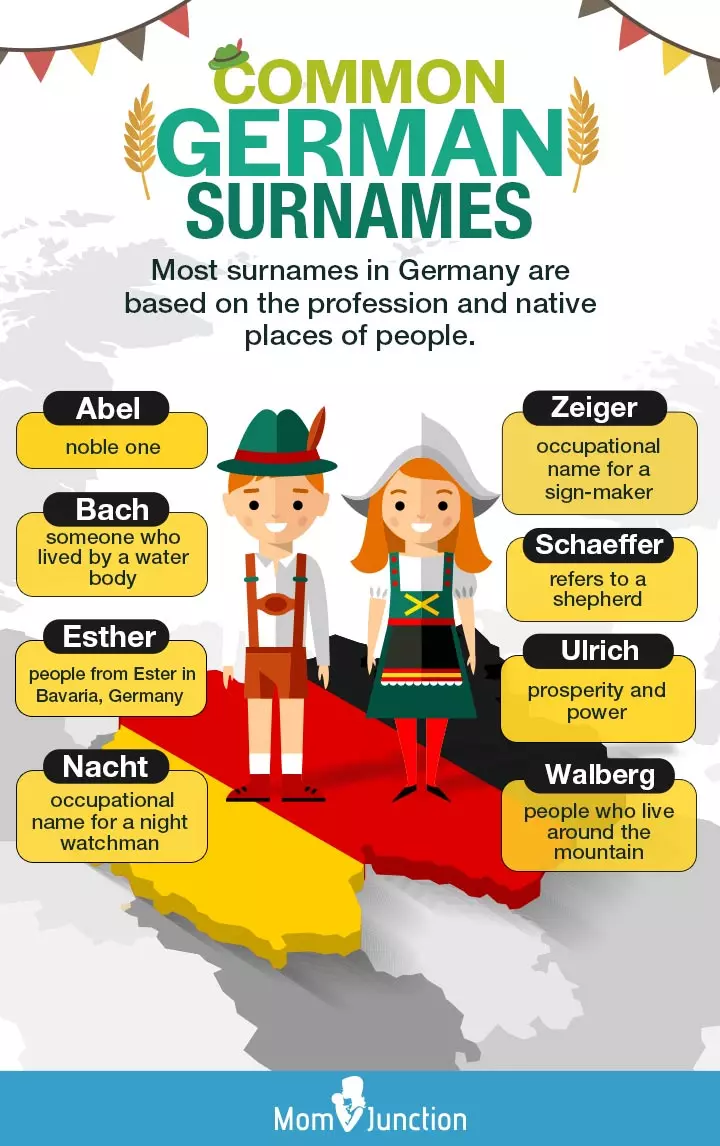
Illustration: Top German Last Names Or Surnames With Meanings

Image: Stable Diffusion/MomJunction Design Team
German last names have a variety of interesting meanings. This video breakdown the meanings of common and famous last names in this language so you can gain a better understanding.
References
- Marie-France Valeta; The surname of married women in the European Union.
https://citeseerx.ist.psu.edu/viewdoc/download?rep=rep1&type=pdf&doi=10.1.1.218.5543
Community Experiences
Join the conversation and become a part of our nurturing community! Share your stories, experiences, and insights to connect with fellow parents.
Read full bio of Shikha Thakur
Read full bio of Srija Chanda Burman
Read full bio of N Pravenchandra Singh









